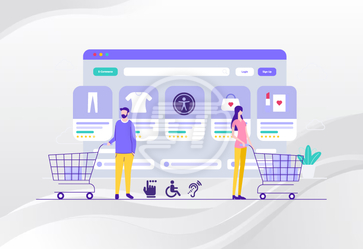When the whole world is talking about digital accessibility, Germany is also not behind!
They have chosen a proactive approach to rectify and implement accessibility in their online products and services and eliminate discrimination against individuals with disabilities by putting effort into resolving the problems they encounter while exploring digital products and services.
Accessibility can be achieved by applying the right methods and best web practices and keeping this in account, Germany enacted its first digital accessibility act on Equal Opportunity for Disabled Persons BGG on April 27, 2002. Another crucial act is BITV, which was issued on July 17, 2002, with its first version BITV 1.0. The standard was inspired by WCAG's initial version. The latest updated version is BITV 2.0 with refreshed guidelines released on September 12, 2011.
YOU MAY ALSO LIKE: International Web Accessibility Standards
Let us know in-depth information about these laws to promote inclusivity and accessibility in Germany.
Disability Equality Act – BGG
This act mandates that every citizen with or without any physical, and/or any other types of disabilities must have access to online products and services. BGG directly impacts organizations and businesses that are governed or owned by the federal government, subordinate to the federal government, controlled by the Confederation, etc. These organizations and businesses are expected to provide alternative means such as sign language or other suitable communication aids to provide barrier-free information technology websites and mobile applications.
The act covers every facet of the website/application to accommodate the needs of users with disabilities. If an organization fails to adhere to Disability Equality Act, its consequences might land the organization in trouble.
Federal Ordinance on Barrier-Free Information Technology – BITV
The Berlin Barrier-Free Information Technology Ordinance (BITV) is based on the disability discrimination act and was enacted by the Federal Ministry of Labor and Social Affairs and the Federal Ministry of the Interior in 2002. It is intended to allow people with disabilities to easily access online information and technology.
BITV is applied to all websites, mobile applications, intranets, and extranets, electronically supported administrative processes, and graphical program interfaces.
Moreover, European web accessibility standards (EN 301549) are also incorporated into the BITV 2.0. It follows the Web Content Accessibility Guidelines 2.0 of W3C with some minor additions. BITV 2.0, like Section 508 in the U.S.A., affects all German public bodies and federal agencies and vendors, contractors, and partners of those agencies by mandating them to ensure information and services that are made available electronically are accessible and usable by people with disabilities. BITV 2.0 like Section 508 in USA; affects all German public bodies and federal agencies, contractors, vendors, partners by mandating them.
Requirements of BGG and BITV
BGG and BITV were initially focused on German Federal government websites. However, with time, other state and local agencies, vendors, contractors, partners, and private sectors all started building their websites, mobile applications, and all digital services as per BITV recommendations.
Organizations must provide reasonable accommodation for people with disabilities so that they can have access to their desired online content. Responsive design must include,
- Alt text for images
- Subtitles/transcripts for audio and video content
- Proper color contrast
- Keyboard navigation
- Screen readers compatibility
- Accessible PDFs and other documents
- Readable text, etc.
There was a deadline for all organizations to apply the standards; they were expected to implement the standards by December 31, 2005.
As written above, the latest version of BITV 2.0 included the provisions of the EU directives that were not a part of BGG. Therefore, all websites were asked to publish the same by September 23, 2020, and mobile applications by June 23, 2021.
If websites have accessibility exceptions, that should be clearly mentioned in the statement. Also, if a user with disability encounters any accessibility issue which is not outlined in the exception, there should be a contact detail wherein they can talk or submit their problems.
The statement must get updated every three years. Continuous evaluation of website accessibility is required to maintain their accessibility status.
Legal consequences of websites’ non-compliance
Section 16 of the German Act on Equal Opportunities for Persons with Disabilities made it compulsory that there should be an arbitration service set up to resolve conflicts between users with disabilities and organizations that fail to provide accessible web content to them.
If such users wish to take legal action, their plaintiff submits a complaint through the arbitration service’s website. Both parties are expected to work together to resolve accessibility issues to settle the matter without taking it to the courts.
However, if the plaintiff finds the measurements taken are not resolving the issues, then they can go to the courts for better solutions. It leads to hefty penalties and brand reputation damage for those organizations.
Wrapping up
What will be more expensive, brand image or accessibility implementation? If brand image matters to you, remediating your digital assets against BITV 2.0 should be your immediate step. With implementing website accessibility compliance features provide accessible information technology and compliance with Federal Disabled Equalization Law (BGG), Barrierefreie-Informationstechnik-Verordnung (BITV) 2.0, and WCAG 2.1 AA laws and guidelines.
With a team of experts, we provide full managed ADA website accessibility remediation services including audit, strategy, design, development, remediation, and VPAT services that comply with accessibility regulations within your budget. Contact us at [email protected] or request a quote.


